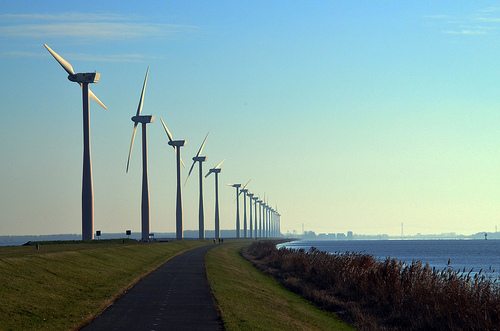

Features
Mythbusting: opinions or facts on wind and shale?
Kate Turner, external affairs manager at Good Energy, debunks some of the most common myths on shale gas and wind power.
Matt Ridley’s column in the Times last week began with a quote from US senator Daniel Patrick Moynihan: “You are entitled to your opinions, but not to your own facts”.
The shale debate isn’t going to go away anytime soon, so we thought we’d point you in the direction of some interesting articles on the topic. This article from the New Scientist gives a good, balanced view of the controversial technique. Elsewhere, Friends of the Earth’s Craig Bennett looks at five reasons why drilling for shale isn’t a good idea and the Carbon Brief has been comprehensively covering the issue.
Ironically, in an article that begins by bemoaning the use of myth and opinions, Ridley goes on to catalogue a number of claims about wind farms. We thought we’d respond to some of those claims.
Luring landowners with money: wind farms pay up to £100,000 per turbine to landowners and most of that comes from additions to ordinary people’s electricity bills
It’s not exactly groundbreaking news that people who generate electricity receive income for doing so. Support from energy bills is there because renewable electricity a) helps improve our energy security and b) reduces our carbon emissions. We can’t see why that’s a bad thing.
How much support is received is monitored by both the Department of Energy and Climate Change and the Treasury to ensure that projects are not over-subsidised. Only a fraction of the increase we’re seeing on our energy bills is due to investment in renewable energy. According to Ofgem, renewables costs account for £27 on the average household electricity bill of £531.
Spoiling God’s glorious creation; bird deaths
Carbon Brief’s blog on bird deaths and wind turbines examines what the latest peer-reviewed research says. Overall, it concludes that appropriately located wind farms have negligible impacts on birds.
RSPB research shows that UK cats catch 55m birds each year, and academic research shows that for every bird killed by a turbine, 5,820, on average, are killed striking buildings, typically windows.
It’s also worth noting that the impact of wind farms on birds is assessed as part of the planning application process.
Wind provides about 1% of our total energy
It’s difficult to assess what Ridley means by ‘total energy’. We’ve long been vocal in calling for the UK to do more to increase its use of renewable resources. The UK certainly lags behind other European countries in that respect, but the good news is that things are starting to change rapidly. The UK has around 40% of Europe’s wind resource, so wind farms are key to that change.
The Government’s annual digest of UK energy statistics confirms that electricity from renewable energy sources rose 19% last year, accounting for 11.3% of all electricity generation. Wind is the dominant technology generating 45% of the UK’s clean electricity.
‘Last weekend I drove from Caithness to Northumberland. View after view was spoilt by the spinning monsters’
Surely this is the kind of opinion that Ridley himself is riling about? In an ICM poll last October, when asked to choose between having a wind turbine or a shale gas well within two miles of their home, 67% of respondents favoured a turbine, compared to just 11% who would support the gas development.
All of these points are ones that we think need addressing. But within all the specifics, Ridley and other supporters of shale gas have still failed to answer one fundamental question.
What happens when shale gas runs out? That’s why we think the government is on the wrong track with fracking.
Further reading:
Renewable energy: debunking the subsidy and efficiency myths
































